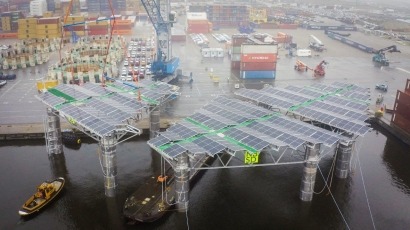
The Merganser project, developed by SolarDuck and supported by RWE, features an offshore floating solar pilot with a capacity of 520 kWp. Comprising six interconnected platforms, the solution is designed to withstand challenging offshore conditions, including high waves, strong winds, and corrosive environments.
The design has been certified to withstand a maximum wave height of 11.6 meters (with a directional 10-year return period) at a water depth of 21.5 meters (MSL) at the North Sea Farmers test site. It will be deployed off the coast of The Hague, Netherlands, providing a real-world operational environment to evaluate its performance and resilience in the North Sea.
The certification of the Merganser prototype follows the Approval in Principle (AiP) granted for the floating structure. Throughout the certification process, Bureau Veritas evaluated the prototype against rules and standards, including guidance note NI631 on the Certification Scheme for Marine Renewable Energy Technologies.
These assessments covered various aspects such as the floating structure, mooring system, stability analysis, materials, and electrical safety systems. Moving forward, the technology will be further evaluated for a type certification.
Don Hoogendoorn, CTO of SolarDuck, commented, “A key step in making the technology bankable is obtaining certification of the technology. As long-standing partners, SolarDuck has cooperated closely together with Bureau Veritas to verify the technology for the harsh North Sea conditions, marking a significant milestone in the development of our offshore floating solar technology.”
“The certification of SolarDuck's prototype Merganser reflects the collaborative efforts between Bureau Veritas and industry innovators in advancing sustainable energy solutions," says Martijn Nieuwenhuijs, Country Chief Executive, Bureau Veritas Marine & Offshore Netherlands.

